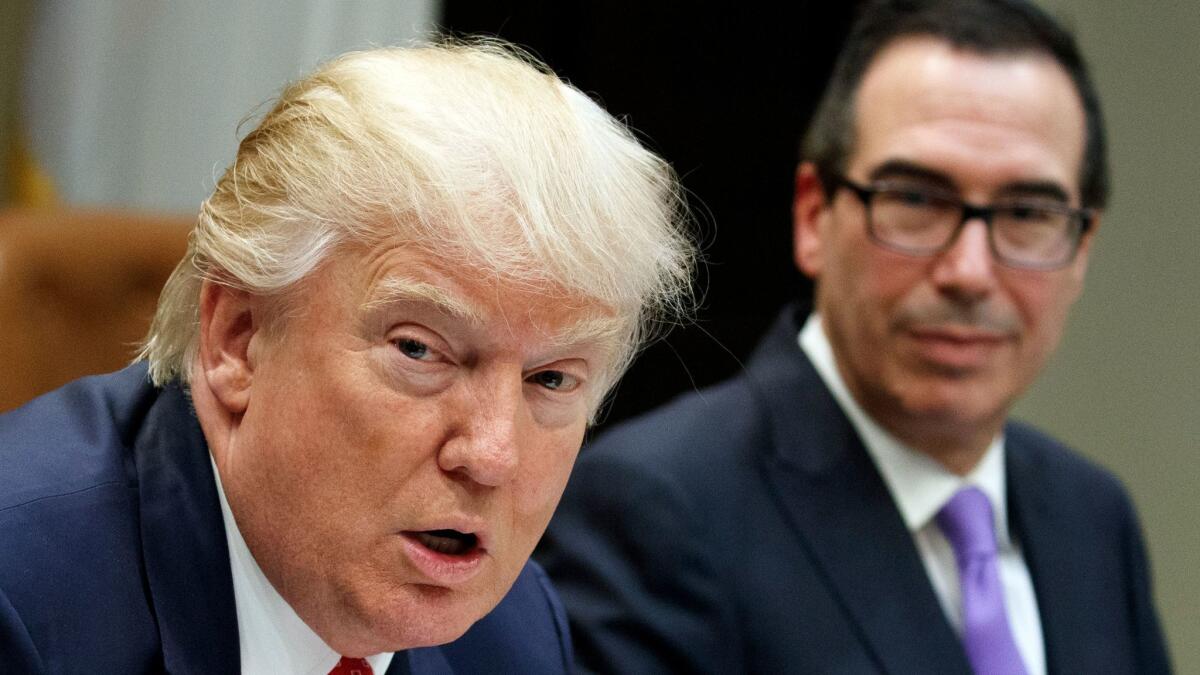Op-Ed: Trump’s Treasury secretary is an Artificial Intelligence denier

- Share via
Treasury Secretary Steven Mnuchin last week made a dangerously ignorant prediction. When asked about the future of artificial intelligence, automation and the workforce, this was his reply: “It’s not even on our radar screen,” he said at a media event, adding that significant workforce disruption due to AI is “50 to 100” years away. “I’m not worried at all” about robots displacing humans in the near future, Mnuchin said. “In fact I’m optimistic.”
The Trump administration has repeatedly rejected evidence-based research and objective analysis on issues that include climate and human biology. When confronted with a complicated technology, like machine learning, administration officials now appear to be rejecting curiosity, too.
If Mnuchin was speaking in earnest, then we apparently have a Treasury secretary who, like the president he serves, does not read. To argue that we’re “50 to 100” years away from AI and automation tells us that Mnuchin took office without bothering to look over any of the economic studies or policy papers about the future of technology and the American workforce written during the past four decades. It means that, somehow, he’s missed thousands of news stories published in the American Spectator, the Economist, the Washington Post, the Wall Street Journal, the National Review, this newspaper and elsewhere. It means that Mnuchin hasn’t even been paying attention to the future of his own industry –– otherwise he’d know that JPMorgan Chase CEO Jamie Dimon, in his 2016 annual letter to shareholders, cited AI as a significant threat to jobs in the banking sector.
AI won’t just affect [truck drivers], of course, it will soon affect every worker who processes transactions, and that includes white collar jobs.
Mnuchin’s statements also reveal that he is willfully and actively ignoring critical signals about our future. He suffers from the paradox of the present — the delusion that the way things are now will continue indefinitely. Because he lacks direct exposure to the enormously complicated AI ecosystem, he outright rejects its reality.
Like his buddies in the Cabinet, he is obsessed with making America great again — with trying to rebuild the past. He is foolishly optimistic that we can all return to what’s familiar and comfortable.
And yet here’s what we already know is on the horizon. The same week that President Trump climbed into the seat of a big rig wearing an “I ♥ TRUCKS” lapel pin, two autonomous trucking companies, Otto and Embark, were readying their driverless vehicles for the open road. The machine learning algorithms and sensors that power the autopilot capabilities in cars and trucks already exist today. In the near future, humans may still be needed to navigate local roads and parking lots, but it won’t take long — certainly not “50 to 100” years — before American truck drivers need to start looking for other work. And, yes, there are many possible roadblocks along the way to full autonomy — for example, government restrictions seeking to protect truckers’ jobs — but we’re speeding toward a scenario in which America’s 3.5 million professional truck drivers won’t be needed anymore.
As an AI-denier, Mnuchin is also disregarding the millions of other jobs in adjacent industries that are at risk. Once we no longer have truck drivers, we’ll have no need for truck stops, which will hurt the bottom line of fast food chains, soda and water companies, vending machine operators, and even the restroom supply chain (toilet paper, soap, paper towels). With autonomous cars and trucks, we won’t need the Highway Patrol, either. Companies that supply radar guns will go under unless they find another product to produce. There will be a sharp decline in speeding and parking tickets issued, which will cut into city and state budgets. If we no longer have speeding tickets, we’ll have no need for traffic court — and all of the lawyers, judges, magistrates and clerks who currently earn their livings there.
But AI won’t just affect driving, of course, it will soon affect every worker who processes transactions, and that includes white collar jobs. Already, machines are out-performing humans at storied investment banks like Goldman Sachs, where four traders can be replaced by one computer engineer and a handful of complex trading algorithms with machine-learning capabilities. According to a January study by the McKinsey Global Institute, nearly 23% of a lawyer’s job can be automated right now. Legal startup Ross, which leverages IBM Watson’s AI technology, takes just seconds to process a research request that would require a high-paid human lawyer 10 hours.
AI will not obviate all jobs. As the ecosystem matures we will create millions of new jobs with titles that don’t yet exist: We’ll need medical data specialists, engineers who can securely encrypt the cloud, congressional staffers with technical expertise, skilled workers who know how to prevent and fix glitches in the system, even ethicists who will help machines learn to make decisions.
It’s plausible that Mnuchin already knows all of this and was optimistic about our American grit and adaptability. Or maybe he is disconnected from reality. Or perhaps he was simply employing the Trump administration’s default position: placating the masses with a blanket assurance that everything will be OK. Regardless, you should be concerned.
Amy Webb is the author of “The Signals Are Talking: Why Today’s Fringe Is Tomorrow’s Mainstream” and is the chief executive of the Future Today Institute.
Follow the Opinion section on Twitter @latimesopinion or Facebook
MORE FROM OPINION
Note to Republicans: Drop the crusade against Planned Parenthood
Who’s to blame for Trump’s failures? Must be Paul Ryan
More to Read
A cure for the common opinion
Get thought-provoking perspectives with our weekly newsletter.
You may occasionally receive promotional content from the Los Angeles Times.









